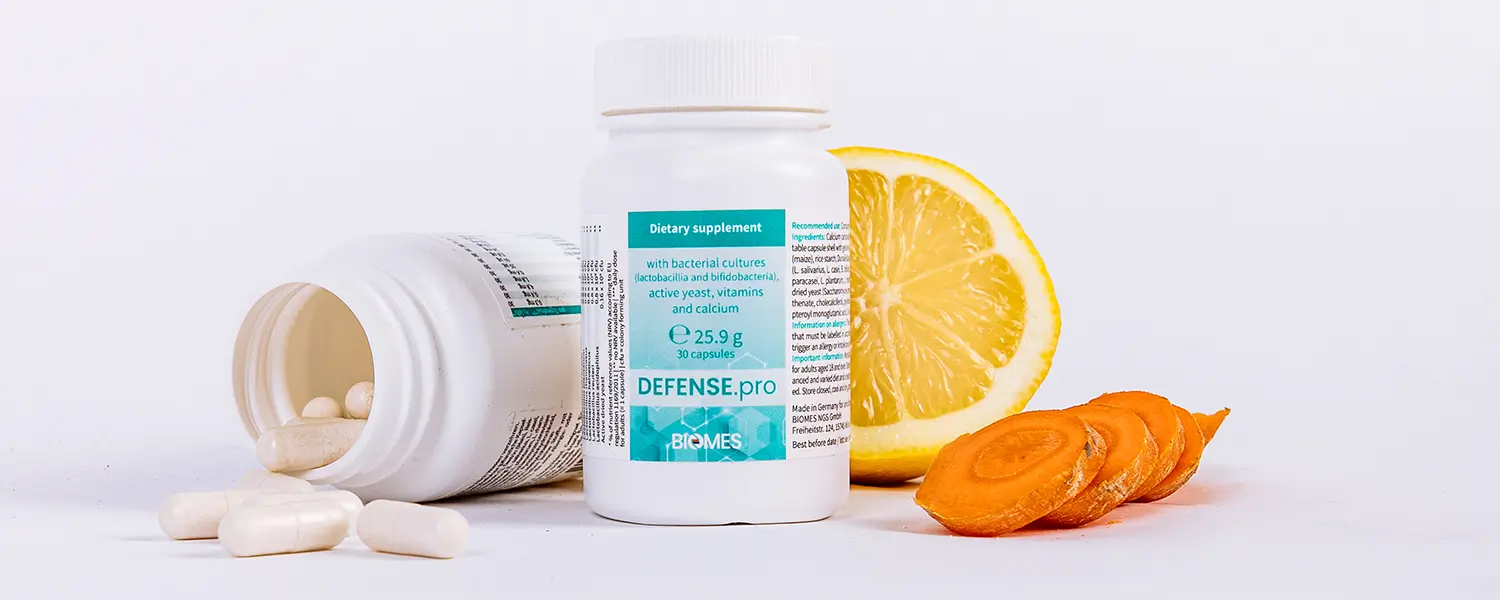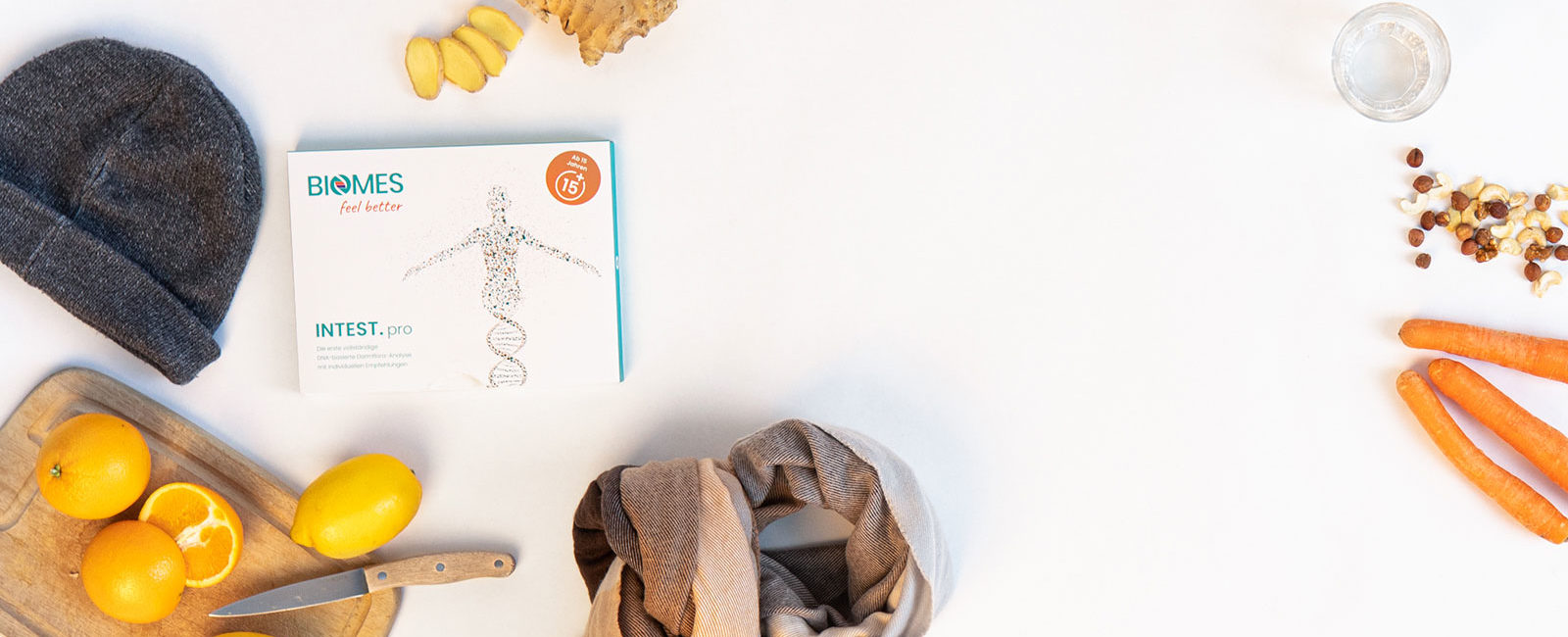Muscle building exercises are important at any age. At BIOMES you can find out what muscle building exercises should look [...]

Immune system composition
In everyday life, everyone comes into contact with a multitude of pathogens. It is the task of your body’s own defence system to prevent them from damaging your organism and making you ill. It ensures that invading bacteria and viruses are recognized and eliminated. The most important information about the structure of the immune system and how it works can be found here.
Immune system: Definition
The immune system is – simply explained – the defence system of the body. It ensures that pathogens such as bacteria and viruses, fungi, germs and parasites that enter the body are fought and infection is prevented. However, the immune system is not an independent organ. Rather, it is made up of numerous components: These include organs such as the skin, spleen and intestines. Together with other endogenous systems, these protect the organism from disease.
Double defence, double protection
The immune system fights pathogens in two ways. These complement each other and provide comprehensive protection. There is the non-specific, innate defence and the specific, acquired defence. Together, both ensure that the immune system can fulfil its function.
Immune system: What is the unspecific, innate defence system?
The unspecific immune system is active from birth and is able to render a multitude of pathogens in the body harmless. The system uses both cellular and non-cellular (humoral) mechanisms. Among the cellular mechanisms are the so-called scavenger cells, which take up foreign bodies and pests, break them up inside and thereby destroy them. The humoral defence (from the Latin “humor” for liquid), on the other hand, uses the body’s own dissolved substances such as enzymes, which are found in body fluids and have an antibacterial effect. Furthermore, the so-called complement system belongs to the non-specific defence. This is an enzymatic system of the liver that can dissolve invading foreign cells.
Immune system: What is the specific, acquired defence system?
The immune system can also form specific defence cells against certain pathogens as soon as it comes into contact with them for the first time. This so-called specific defence system is therefore not active from birth, but only develops.
When the body comes into contact for the first time with a pathogen against which the specific defence can develop specific defence cells, the organism produces immune cells (B and T lymphocytes). These antibodies are always “tailor-made” for one type of pathogen. They can bind to the pathogens and thus destroy them directly. Sometimes, however, the binding of the antibodies also ensures that the non-specific defence can more easily render the pathogens harmless. At the same time, the organism forms memory cells for this particular pathogen. If a new infection occurs, the body can immediately recognize the pathogen type and produce the specific antibodies much faster.

Development of the immune system: These systems are involved in the defence
For the body to show an immune reaction to pathogens such as bacteria, viruses or fungi, various body systems and organs must work together. The components of the immune system include:
- Skin and mucous membranes
- Tonsils
- Thymus
- lympic system
- Spleen
- Bone marrow
- Intestine
Each of these organs and systems is involved in building the immune system and has a specific function. The skin and mucous membranes form the first barrier against pathogens and protect the body in the best possible way against the penetration of pathogens. On the palatine and pharyngeal tonsils, bacteria that have reached the oral cavity come into contact with immune cells for the first time. The thymus (a gland above the heart) is significantly involved in the development of the immune cells. It ensures, for example, that the lymphocytes are able to differentiate between the body’s own cells and foreign cells. The lymphatic system is responsible for the removal of pathogens .
In addition, the spleen is an essential component of the immune system: it is responsible for the breakdown of old red blood cells and stores the scavenger cells of the non-specific defence system. It also ensures the multiplication of lymphocytes, which then mature in the thymus. The bone marrow is also decisive for the development of the immune system: both the red and white blood cells are formed there as well as the blood platelets (thrombocytes) which are decisive for haemostasis or coagulation. From there, the corresponding cells are transferred to other organs responsible for reproduction and maturation and ensure a strong immune system overall.
The intestines and intestinal flora are also among the most important components of the immune system. Around two thirds of all antibody-forming immune cells are located there and ensure effective defence against foreign invaders. The defence cells of the intestine mark and destroy the pathogens and store information about foreign cells so that they can react more quickly to them in the future. In addition, bacteria of the intestinal flora ensure that pathogens cannot settle so easily. A healthy intestine is therefore necessary for a functioning defence system.
Healthy intestine – strong immune system
If you want to know how your intestinal health is, the intestinal test from BIOMES is the right choice. With the help of INTEST.pro, a modern analysis procedure, you can get an overview of the composition of your intestinal flora. In this way, you can find out whether the bacterial balance in your intestine is in balance. Since the intestine is essentially involved in the development of the immune system, healthy intestinal activity is one of the basic conditions for strong defences. Following the intestinal analysis, you will receive the test results and personalized recommendations.




